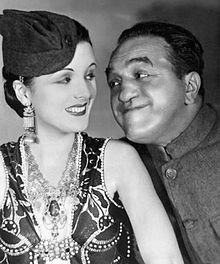Louis Wolheim
| Louis Wolheim | |
|---|---|

|
|
| Born | March 28, 1880 New York City, New York, USA |
| Died | February 18, 1931 (aged 50) Los Angeles, California, USA |
| Occupation | Actor |
| Years active | 1914–1931 |
Louis R. Wolheim (March 28, 1880 – February 18, 1931) was an American actor, of both stage and screen, whose rough physical appearance relegated him to roles mostly of thugs or villains in the movies, but whose talent allowed him to flourish on stage. His career was mostly contained during the silent era of the film industry, due to his untimely death at the age of 50 in 1931.
Born in New York City in 1880, he attended Cornell University, where he graduated with a degree in engineering. After graduation he taught mathematics, including 6 years as an instructor at Cornell. Despite his rugged visage, Wolheim was intelligent and cultivated, speaking French, German, Spanish, and Yiddish. According to Wolheim, while at Cornell, he suffered an injury to his nose during a football game, and, after having the nose seen to by medical professionals, later that same day he got into a physical altercation (which he won), although his nose suffered more damage, ending up becoming almost a trademark for him. After the United States entrance into World War I, Wolheim joined the United States Army, and was in Officer's training at Camp Zachary Taylor in Louisville, Kentucky when hostilities ended. Not wanting to remain in the service as a career, he asked for and was granted a discharge.
In 1914, on the advice of Lionel Barrymore and John Barrymore, Wolheim entered films. Both brothers also invited him to appear in the 1919 play The Jest in which the Barrymores co-starred. He would appear in at least five films with Lionel Barrymore including a serial and three films with John Barrymore, Dr Jekyll & Mr Hyde (1920), Sherlock Holmes (1922) and Tempest (1928). Wolheim appeared in two silent films with their sister Ethel Barrymore. Wolheim's fearsome visage almost immediately typecast him in roles as gangsters, executioners (as in D. W. Griffith's Orphans of the Storm) or prisoners. Towards the end of the 1920s, he occasionally broke out of these stereotypes and played a comic Russian officer in Tempest and a rambunctious Sergeant in Howard Hughes's Two Arabian Knights. He also played a Chaneyesque gangster in Hughes's splendidly photographed The Racket, a lost film for over 70 years recently rediscovered.
...
Wikipedia
